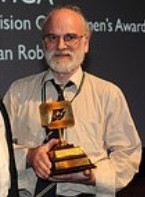GTC Award Winners 2009

Congratulations to all the winners of GTC Awards for 2009 which were presented at the BFI Southbank, London on Tuesday 6 October. See the full list of winners and citations from GTC Chairman and MC for the Awards evening, Brian Rose, below.
TiCA
Alan Roberts
The Guild of Television Cameramen’s Award is awarded to an individual who, in the opinion of the Council, has furthered the cause of the Guild by fostering and improving the art and craft of the professional television cameraman over many years.
It is our major Award and this year, goes to a scientist.
Just as the work of the television cameraman is often not fully appreciated; eclipsed as it is by the ‘talent’ in front of the camera, or by the director; so the work of the backroom boys who help as to create those images, all too often goes unrecognised.
Over many years, the recipient of the Award, has worked towards helping every one of us to improve our images. A leading colour scientist, working for BBC Research and Development, he has not only contributed to the technology behind the camera, with a huge number of White Papers, but has directly helped untold numbers of television cameramen get the very best images out of modern digital and high definition cameras.
This is no small talent. He combines the knowledge necessary to produce technically compliant images with a deep understanding of what makes pictures look beautiful and tell a story.
His advice and recommended set-ups have become the de facto settings throughout the world and he is constantly adding to this knowledge. He is equally at home with handling the intricacies of colour science with pages and pages of algebraic notations as he is with explaining how it all works to those of us whose minds go blank at the very sight of more than two numbers.
He is one of those rare scientists who can explain it all and empower us to produce stunning images. It’s a rare talent.
GTC Awards for Excellence
Entertainment
Karsten Jacobsen: Eurovision Song Contest 2009 - Moscow'(steadicam)
Eurovision Song Contest 2009 - Moscow'(steadicam)
I was always taught that the skill of the camera operator was to totally disappear. You should take the audience where the director wants you to take them, without them being aware that they are being taken there.
Great advice for Drama, but Entertainment often calls for a different approach. Here, the camera has to add to the excitement of the event.
Adding to that excitement is not always easy, especially when one is pushed to create shots that leave the audience quite stunned; when even fellow cameramen are left wondering, ‘How the hell did they do that?’....
Drama
Dominic Clemence : Kingdom - Crop Circles
: Kingdom - Crop Circles
Take a good script, popular actors, beautiful locations and an excellent director and what do you have? Not much, unless the photography is outstanding.
Television is television – if you’re to hold an audience, it’s the pictures that count, it’s the pictures that tell the story. No more is this apparent than in the winning entry in this year’s Drama category.
The camera work and lighting take the audience into the story (and hold them there) without once getting in the way; a disappearing act worthy of the protagonists in front of the camera….
Extreme conditions
Bali Strickland : South Pacific (super slo-mo underwater work)
: South Pacific (super slo-mo underwater work)
Once it was enough just to get a camera under the water – some of you may remember being entranced by the films of Hans and Lottie Hass. But these days, audiences are more and more demanding and with HDTV, they want that extra special experience.
South Pacific was such a series of programmes. The photography throughout was stunning. But there was one sequence that left you breathless. Big waves, perfect composition, beautiful lighting and all shot at high speed...
Extreme
Jonathan Young, Mark McCauley : Return to Afghanistan (Ross Kemp)
: Return to Afghanistan (Ross Kemp)
The judges decided to award two different cameramen for different episodes of the same programme. Once you’ve seen their work, you’ll realise why.
 Covering war zones has never been an easy task. Most people would advise putting on the longest lens you can find and keeping well away, out of the danger zone.
Covering war zones has never been an easy task. Most people would advise putting on the longest lens you can find and keeping well away, out of the danger zone.
But some programmes call for a somewhat different approach. They demand that you take the audience right into the front line and beyond. It takes a very special kind of cameraman to work under such conditions. It takes an even more special kind of cameraman to return usable shots, while being shot at himself. And it takes an even more special kind of cameraman to return outstandingly good photography under such conditions.
The fact that we managed to find two of them, is even more remarkable!....
Factual
Yann Arthus-Bertrand and Camera Crew: Home
It’s very easy to use the term ‘rhapsodic’ when describing camera work. But when a film takes us all around the world, to show us just how fragile our planet is, such words come immediately to mind.
Shot from the air, by the world’s leading aerial cameramen, the pictures in 'Home' are quite stunning in themselves. But the real achievement is perhaps that they flow into each other in such a way that again, the whole is much larger than the sum of each cameraman’s achievement.
Not only does it tell the story, but hopefully, it encourages you to actual do something, before it is too late…..
Factual
Will Edwards: Cruickshank on Kew
We are all too aware that documentaries these days, all too often mean so called ‘reality’ programmes self-shot on prosumer cameras by the director’s cat.
Facebook and U-Tube haven’t helped as newer audiences assume that poorly composed, unsteady and out of focus shots are now the norm; as my old teacher said to us once ‘If you’re supposed to be the cream of this school, God help the skimmed milk!’
But if we are willing to ignore the health warnings, there is still cream out there.
Such all too rare programmes that are sympathetically shot to their subject, tell the story and allow us to enjoy the images. It’s a combination of craft, skill and talent.
Innovation
Mitch Stratten and Camera Crew: Toshiba Timesculpture
Producers and directors of commercials are always looking at new ways of presenting their vision. Again, it’s a case of holding the viewers’ attention and getting over an idea in a memorable way.
It’s this kind of demand that drives innovation forward. Indeed, more often than not, it’s the commercials – with their requirement for getting over the idea in the shortest possible time – that are responsible for all those new developments in technology.
With CGI, digital editing and image manipulation already well established, the question is, ‘Where do we go from here?’
Multi Camera
Barrie Dodd and Crew: Jeff Beck at Ronnie Scott's

Music is one of those areas which needs some very special skills if what you want on the screen is sheer quality.
All too often, there isn’t sufficient time for a proper rehearsal, it’s a difficult location and each cameraman has to be sympathetic – not only to the music itself – but to each other and to the director.
It’s a case of many bodies contributing to a whole, which is much greater than the sum of each single effort.
When it works, it works magnificently...
Seal of Approval
Cammotion, Vortex Aerial Camera Mount System
The Seal of Approval is awarded to a manufacturer for a piece of equipment that, having been nominated by the membership and voted for by Council, has significantly aided cameramen in the advancement of their craft.
After considerable discussion, Council felt that one piece of
equipment, the Vortex Aerial Camera Mount, stood out above the rest. It has proved itself on numerous OBs, dramas and LE productions. As a portable camera tower, it allows the camera to be rigged up to a height of 30 metres in minutes. You can then operate the camera with a full 360 deg pan, whilst at the same time jibbing the camera at up to 2 metres per sec; all in wind speeds up to force 7.
Vortex Aerial Camera Mount, stood out above the rest. It has proved itself on numerous OBs, dramas and LE productions. As a portable camera tower, it allows the camera to be rigged up to a height of 30 metres in minutes. You can then operate the camera with a full 360 deg pan, whilst at the same time jibbing the camera at up to 2 metres per sec; all in wind speeds up to force 7.
We were particularly impressed not only by the simplicity and speed of rigging, but also at the wide range of shots that can be offered by such a rig.
Rather than coming from a large company, the system was designed by a cameraman, Matt Gladstone.
Fellowship
Les Ager
The recipient of our first Fellowship has served on Council for well over a quarter of a century. This in itself is a remarkable achievement.
He has looked after the GTC’s sponsors for virtually all that time, nurturing them, bringing in new sponsors and tirelessly looking after all the paper chases that go with such a task. Were it not for the generosity of our sponsors, the GTC could not carry out the work that it does; and were it not for the tireless work of the Sponsor Liaison Officer, we would have no sponsors.
With the ongoing downturn in the economy – and it’s been happening in the television industry for far longer than the past year – he has managed to keep the vast majority of our sponsors on-board; a remarkable achievement.
Now, having just turned 85 he feels he needs to start taking things a little easier.
Fellowship
Dudley Darby
There is one job on Council which is totally thankless. Not Chairman (although that can be bad enough!). Whatever you do, someone is sure to complain. You have to be at meetings well ahead of everyone to set up, and well after, to tidy up.
You are responsible for ensuring that everyone has been informed of the meeting, that an Agenda has been properly prepared, that the minutes have been accurately prepared and circulated and that the meeting itself has been properly constituted.
As guardian of the Constitution, you have to ensure that all business is carried out in compliance with the Constitution, no matter how passionate members may be to bring forward their ideas.
In short, you’re on a hiding to nothing.
To have carried out the job of Secretary for so many years takes very special effort and indeed it needs a very special person to do that job, efficiently, honourably and without (too much) compliant.
The immediate past secretary is such a person. It gives me great pleasure to announce that our second Fellowship goes to Dudley Darby.















